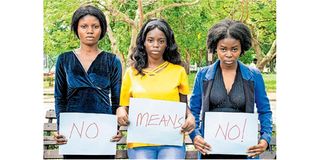Chimamanda Ngozi's traumatic experience of sexual assault

Campaign against sexual harassment.
What you need to know:
- Girls are wrongfully informed to be aspirational but not too ambitious, they are guided to be successful but not too affluent, to avoid threatening their partner.
- If a woman is the breadwinner in a relationship, she is expected to pretend she is not, especially in public, in an effort not to emasculate him.
Chimamanda Ngozi Adichie is the most progressive African novelist of the 21st century.
Her transformational work has continually reintroduced the international reading community to short stories, novels, poetry and non-fictional writing set on the African continent.
She is an articulate and knowledgeable Igbo from the vibrant city of Enugu in south-eastern Nigeria. Her classics include her 2003 debut novel Purple Hibiscus, which, among other issues, talks about the psychological effects of domestic violence.
She also authored the multiple award-winning international best-seller Half of a Yellow Sun, a historical story set within Nigeria’s Biafra war, which won the Women’s Prize for Fiction Award in 2007, before it was adapted into a Hollywood motion picture in 2013. In her enlightening non-fiction work, We Should All Be Feminists, Chimamanda states that in 2003, while promoting her novel Purple Hibiscus, in Lagos, Nigeria, a journalist approached her. He informed her that her novel—centred on wife battering—was feminist.

Chimamanda Ngozi Adichie's book, We Should All Be Feminists. It calls for gender equality.
He then expressed his chauvinistic stance while shaking his head. He said she should never call herself a feminist, stating that feminists are unhappy women who cannot find husbands. She was appalled by his tone-deaf statement.
Chimamanda has experienced many forms of feminine discrimination. While conducting a writing workshop in Lagos, one of her participants, a young woman, informed her that a friend had confided in her not to listen to Chimamanda's women empowerment doctrine to avoid absorbing feminist ideas that would destroy her marriage, a baffling and misconstrued statement.
Girls are wrongfully informed to be aspirational but not too ambitious, they are guided to be successful but not too affluent, to avoid threatening their partner. If a woman is the breadwinner in a relationship, she is expected to pretend she is not, especially in public, in an effort not to emasculate him.
Society's nurturing of men as superior beings permeates every aspect of life. In the vibrant city of Lagos, whenever Chimamanda is in male company and she tips a man for helping her park her vehicle, the male company is thanked instead of her.
She once walked into the lobby of a luxurious hotel in Lagos and an inept guard at the entrance stopped her and asked her indefensible and demeaning questions.
The enquiries included her name and room number of the person she was visiting. She was asked to prove that she was a hotel guest by showing her key card.
There is a sexist assumption that a female visiting a hotel alone is a sex worker. It's a misogynist mentality in a society that underrates women and believes that an unaccompanied female can't possibly be a guest paying for her own room.
Each time Chimamanda walks into a Nigerian restaurant with a man, the waiter greets the man and ignores her. The employees are products of a background that has taught them that men are superior to women.
She feels invisible, disconcerted and upset. Always wishing to instruct them that she's just as human as the man and worthy of acknowledgment. She states that at times it is the subtle things that sting the most.
As a 17-year-old aspiring author, an ambitious and resilient Chimamanda approached a male media mogul in the Lagos commercial metropolis of Ikeja. She desired to pitch her writing aspirations and present him with a poetry book she had compiled.
After securing an appointment with the man, she visited his office with ecstatic optimism that he would support her ambition by assisting her in the publication of her work. He was friendly and purportedly impressed that someone of Chimamanda's age had written a book.
As the discussion proceeded, he stood up, walked behind the chair she was seated on and slipped his hand underneath her shirt and bra, before squeezing her breasts.
“I was so taken aback that I did nothing for seconds,” Chimamanda expresses. “Then I pushed his hand away, but gently and nicely, because I didn't want to offend him.”
Through the shock, Chimamanda stayed polite while talking to him, hoping he would assist her. Unfortunately, scores of women just like her see no choice, during their trauma, but to continue interacting with the sexual predators who harm them.
Most of them fear taking a leap of faith to tell their stories and seek justice, because society has developed a sadistic tendency of victimising victims of rape and sexual assault.
Later that day, Chimamanda broke out in hives—astonishing rashes on her face, neck and chest. Her body was physically recoiling while revealing the repulsion and resentment. Her lips were too stunned to voice.
She loathed the man for sexually assaulting her. Her positive self-image was disfigured, she felt as if she didn't matter and as though her body was an object that existed merely for him to do as he pleased.
Chimamanda is categorical that men should stand up for equality as they have mothers, grandmothers, aunts and wives who experience the same emotional excruciation. It behoves them to work for an equitable and justifiable society, where their daughters and granddaughters won't have to experience the same atrocities.
Jeff Anthony is a novelist, a Big Brother Africa 2 Kenyan representative and founder of Jeff's Fitness Centre (@jeffbigbrother).





